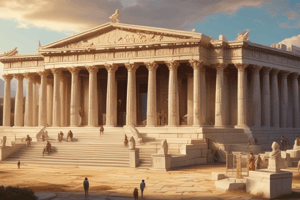Podcast
Questions and Answers
What term is often associated with both mass recruitment and elite governance in ancient political structures?
What term is often associated with both mass recruitment and elite governance in ancient political structures?
- Polis
- Demos (correct)
- Kratos
- Koinonia
Which of these phrases likely indicates a characteristic of elite rule in ancient Athens?
Which of these phrases likely indicates a characteristic of elite rule in ancient Athens?
- Regular elections held every month
- Control of military affairs (correct)
- Direct involvement of the masses in governance
- Complete democracy for all citizens
What does the term 'eutaxia' refer to in the context of ancient governance?
What does the term 'eutaxia' refer to in the context of ancient governance?
- A state of good order and well-governed society (correct)
- A technique for mass mobilization
- An economic model favoring the upper class
- A philosophical approach to justice
In discussing the concept of mass and elite, which aspect is typically questioned regarding the Athenian elite?
In discussing the concept of mass and elite, which aspect is typically questioned regarding the Athenian elite?
What was a common misconception about the governance in ancient Athens?
What was a common misconception about the governance in ancient Athens?
What concept does Josiah Ober discuss in relation to ancient societies?
What concept does Josiah Ober discuss in relation to ancient societies?
Which of the following pairs does NOT represent a binary category by Ober?
Which of the following pairs does NOT represent a binary category by Ober?
In his analysis, which historical periods does Josiah Ober cover?
In his analysis, which historical periods does Josiah Ober cover?
Which term refers to the 'elite' in the binary classifications discussed by Ober?
Which term refers to the 'elite' in the binary classifications discussed by Ober?
What is a theme within Ober's work regarding ancient democratic systems?
What is a theme within Ober's work regarding ancient democratic systems?
Which of the following categories represents the common people in Ober's analysis?
Which of the following categories represents the common people in Ober's analysis?
What key concept is re-evaluated by Josiah Ober in the context of ancient Athens?
What key concept is re-evaluated by Josiah Ober in the context of ancient Athens?
What was the primary aim of Ober’s analysis in his 1989 work?
What was the primary aim of Ober’s analysis in his 1989 work?
Flashcards
Mass and Elite in Democratic Athens
Mass and Elite in Democratic Athens
A book by Josiah Ober that explores the relationship between masses and elites in democratic Athens.
Democracy Ancient and Modern
Democracy Ancient and Modern
A book by Josiah Ober that explores the concept of democracy in ancient and modern times.
Mass and Elite in the Greek and Roman Worlds
Mass and Elite in the Greek and Roman Worlds
The study of the relationship between the common people (masses) and the powerful (elites) in ancient Greece and Rome.
Polloi
Polloi
Signup and view all the flashcards
Olighoi
Olighoi
Signup and view all the flashcards
Plousioi
Plousioi
Signup and view all the flashcards
Aporoi
Aporoi
Signup and view all the flashcards
Binary Categories
Binary Categories
Signup and view all the flashcards
Metriotes
Metriotes
Signup and view all the flashcards
Mesos
Mesos
Signup and view all the flashcards
Demos
Demos
Signup and view all the flashcards
Eutaxia
Eutaxia
Signup and view all the flashcards
Mass and Elite Revisited
Mass and Elite Revisited
Signup and view all the flashcards
Study Notes
Mass and Elite Revisited
- The book, Mass and Elite in Democratic Athens, published in 1989, continues to be relevant in the 2010s.
- The original idea for the book arose from research on Athenian rhetoric in the 5th and 4th centuries BCE.
- The author's dissertation, focused on Athenian defense policy after the Peloponnesian War, led to the book.
- The book examines apparent contradictions in the speeches of Demosthenes, a prominent Athenian orator.
- The author's research developed the concept of "mass and elite", which is now used extensively by scholars.
- The author benefited from guidance from Chester Starr, a prominent scholar at the University of Michigan.
- Initial research was connected to Athenian defense policy after the Peloponnesian War.
- Research involved close examination of Attic orators' rhetoric.
- The author discovered contradictions within the speeches of Demosthenes; these contradictions were reconciled by reciprocal exchange between masses and elites.
Political Sociology
- The author recognized the importance of political sociology in understanding Athenian democracy.
- Influential scholar Moses Finley emphasized the intersection of social and political history.
- The author's understanding of Finley's work profoundly shaped the book's approach.
- The study drew inspiration from Michel Foucault's and Max Weber's theories.
- The author's early work was titled "a political sociology of classical Athens".
- Research involved the study and analysis of Athenian political thought and practices.
- The study analyzed the concept of 'mass' and 'elite' in relation to social power and political rule in Athenian society.
- A historical review of elite and mass relationships shaped the theoretical background.
Defining Mass and Elite
- The concept of "mass" and "elite" was central to the research.
- The precise definition of "mass" and "elite" had been elusive.
- Identifying specific and measurable criteria for distinguishing between "mass" and "elite" groups was crucial.
- The study acknowledges that social categories like "mass" and "elite" were not precisely defined in ancient Greece.
- The relevant social vocabulary distinguished between groups like "polloi" and "oligoi", or "plousioi" and "aporoi".
- The study used models of Athenian income distributions to demonstrate the complexity of the population.
- The study argues that the Athenian "mass" was not entirely impoverished, and that a substantial middle class existed.
- The study modeled Athenian society in the Late 4th Century as having 34 categories of income ranging from 67 drachmas to nearly 9000 drachmas per person per year.
- The study claims that 60% of Athenians were part of the middle class
Athenian Society and Politics
- The book examines factors that led to the stability and success of democracy in ancient Athens.
- The author used the Athenian mass and elite concept to identify a particular civic ideology and associated practices.
- The study looked at potential contradictions between elites and masses.
- The study assessed the potential use of reciprocity as a driver of successful policy and stable social order.
Studying That Suits You
Use AI to generate personalized quizzes and flashcards to suit your learning preferences.
Related Documents
Description
Explore the concepts from the book Mass and Elite in Democratic Athens, examining the rhetoric of Athenian democracy, and the dynamics between mass and elite. This quiz delves into Demosthenes' speeches and the historical context that shaped their contradictions. Understand the research framework that influenced modern scholarship on Athenian politics.



